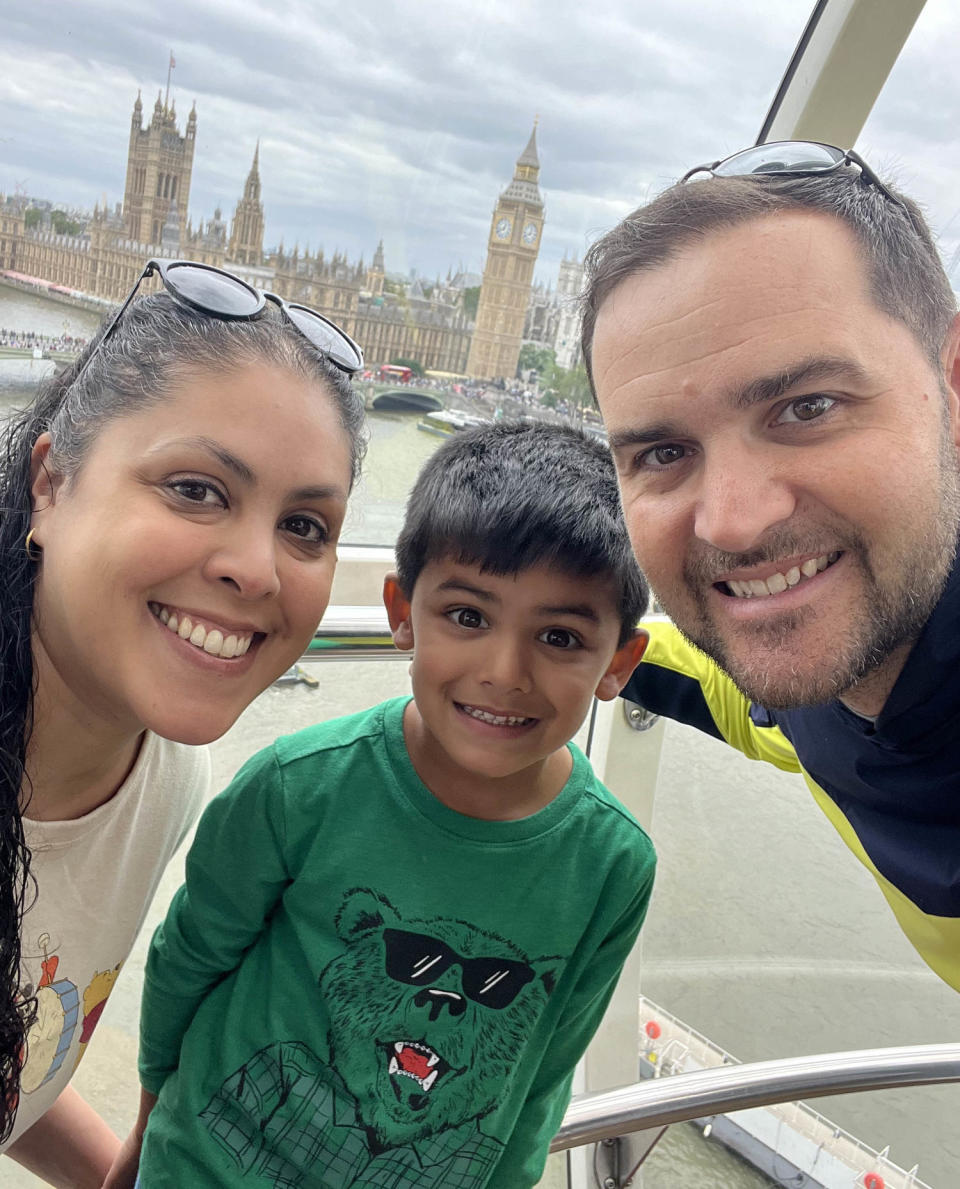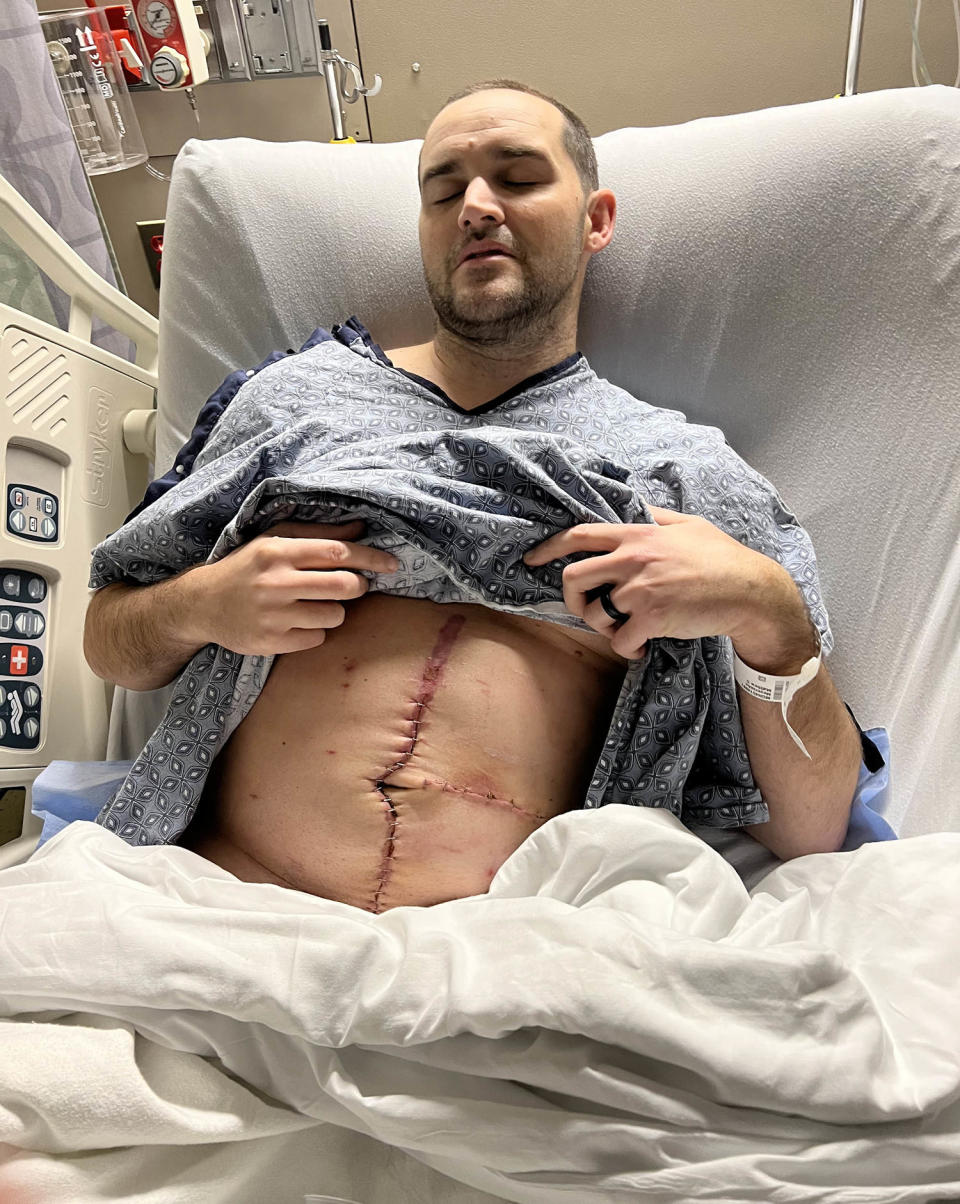After colon cancer diagnosis, dad, 42, starts youth basketball nonprofit
Whether he's walking, working out on a Peloton bike or carrying his bag while golfing, Matt Meyersohn, 42, is "always really active," he tells TODAY.com.
"And I'm someone who measures my activity," says Meyersohn, who lives in Cambridge, Massachusetts. So, when he started to fall behind on his Peloton performance and feel fatigued, Meyersohn was confused.
"I felt like I was in great shape, but I was way behind what I was used to," he explains. Having just hit 40, he assumed it was simply due to getting older.
It wasn't until he felt pain in his side after playing in a golf tournament in the summer of 2022 that he started to suspect something else might be going on. "I felt like I had an oblique strain," he recalls. He tried to rest and brush it off, but he knew he didn't feel right.
The last week of July, he woke up with an urgent need to use the bathroom. "I made it to the bathroom, but not all the way to sitting down," he recalls."And there wasn't any stool. It was just bright red."
Still, he tried to play it off, remembering that he'd eaten a big raspberry smoothie right before bed. But when his wife Nina, a cardiac radiologist at Mass General Brigham, woke up and saw what was left of the mess, "she knew something was wrong and immediately wanted me to go to get checked out," Meyersohn says.

He quickly received a series of tests that revealed stage 3 colon cancer.
Blood tests showed that Meyersohn was severely anemic, which he calls the "the first and only tangible warning sign."
From there, he was able to get a colonoscopy relatively quickly and received a call from his doctor shortly after that. He took the call in his car, with his wife by his side, and learned that he had cancer.
"It was a 14 centimeter mass, which is (about the) size of a softball," he says. And it was wrapped around his colon in the shape of a donut.
First, he and his doctors decided to start him on "a really aggressive three-drug combination of different chemotherapies," Meyersohn says, including one that he took home with him.
Meyersohn was really "wanting normalcy" while going through chemotherapy, he says, so he kept golfing and only took days off when he really need to. But, while his wife and son were in Maine for Labor Day weekend, Meyersohn's situation became even more serious.
He'd left the vacation a day early to play golf with a friend. But once he got home after dinner, he realized he couldn't stand up.
"I went from, 'Wow, that hurts,' to basically falling down on the ground in the most pain I've ever been in," Meyersohn recalls. "I couldn't get up. There was was just pain and my breathing was weird. I didn't know what was going on."
He called his wife, who told him to hang up and call 911. An ambulance rushed him to the hospital where he underwent emergency surgery.
Meyersohn's tumor was constricting his colon and had perforated his bowels.
A perforated bowel can lead to "catastrophic event," Dr. Aparna Parikh, Meyersohn’s oncologist and medical director of the Center for Young Adult Colorectal Cancer at Mass General Brigham, tells TODAY.com. It can lead to serious infections and even death if not treated quickly, she says, which is why Meyersohn required emergency surgery.
With the perforation, Meyersohn's tumor also ruptured, Parikh says. Although his cancer was technically stage 3, "You worry that it's almost essentially stage 4," Parikh explains, "because when it perforates, you're worried that the tumor has now spilled out of a confined space."

"I woke up the next morning in the hospital," he says. "They had done what they could to actually remove and clean up everything that was visible as cancer." The surgeons removed about 40 percent of Meyersohn's colon, he says.
And he woke up with a stoma and an ostomy bag, which collects his waste through a small opening in his abdomen.
"That was one of the harder things for me," Meyersohn says. Learning how to use it and what he could wear with it was a lot to get used to, and it made him self-conscious.
The experience helped Meyersohn make major changes in his life.
Meyersohn spent about eight days in the hospital after his emergency surgery, and took a few more weeks off to recuperate.
It helped him to approach recovery with concrete goals, like he would a sports injury. Some of his first questions out of surgery were about when he could start lifting weights and swinging a golf club again.
"My surgeon was like, 'What is wrong with you? I literally just took you apart and put you back together and like you're worried about these things?'" Meyersohn recalls with a laugh. "But it was so much easier for me mentally to focus on that as opposed to focusing on cancer."
Genetic testing of his tumor revealed "an incredibly uncommon" but "really relevant mutation," Parikh says. Identifying this mutation gave Meyersohn's doctors the option to switch his treatment from chemotherapy to a targeted immunotherapy.
But, with little data on this treatment in stage 3 colon cancer specifically, Meyersohn and his medical team went through "lots of discussions and agonizing decisions" before deciding to go ahead with the immunotherapy, Parikh says
In December, he underwent a second surgery and was able to have his stoma reversed. But he still had plenty of recovery ahead of him.
After a work conference in January, Meyersohn realized he wanted to take his life in a different direction. "It felt good to be doing something and working," he says, "but I was exhausted... It took me like three minutes to get up a flight of stairs because I was moving slowly."
When he got home, "I kind of realized that I needed to take a step away from work. So, for the first time in my adult life, I wasn't working and went on to medical leave," he says.
On days when he felt up to it, he started to work on a dream project — which quickly became a reality.
Meyersohn founded the nonprofit Cambridge Basketball Lab, a youth mentorship and coaching program that gives kids a safe place to play and learn basketball in Boston — free of charge.
The program came out of his frustration that "there wasn't anywhere for kids to go and practice," he explains. While kids whose families had the financial means could work with private trainers or reserve time at expensive gyms, children without those opportunities didn't have anywhere to go, Meyersohn says. Even school gyms were booked up by things like for-profit adult dodgeball leagues.
Today, Cambridge Basketball Lab is open five nights a week for co-ed practice and mentorship.
With the rupture and the stage of his cancer, Meyersohn was at a particularly high risk for recurrence, Parikh says. "But every scan when we get further out from his perforation and treatment," she says, "we're like, fingers crossed, I really hope we cured it."
While he's not a nervous person by nature, he does get anxious when waiting for his scan results. "Those are always a tougher day mentally and emotionally," he says. On those days, he treats himself to his favorite "cheat day" foods and spends time binge-watching TV shows, he says.
But on days when he feels up to it, Meyersohn prefers to spend his time coaching — even if he's only able to sit on the sideline.
And he wishes he hadn't waited so long to start his passion project. "I was so focused on the expectations of having this job and trying to move up in my career," he says. The diagnosis and the emergency surgery were a "reality check that, all of a sudden, life is really fragile," Meyersohn adds.
"Don't put off what feels important," he says.
This article was originally published on TODAY.com

